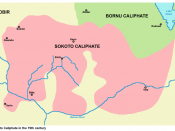Abstract
This paper discusses the diverse views of both Eurocentric and Afrocentric scholars on the Sokoto Jihad movement with reference to their critical assertions. Particularly, the paper explores the fundamental developments that ascribed to the Jihad a revolutionary status. The totality of the paper contributes to existing knowledge by providing a common ground for the presentation and evaluation of diverse views about the Jihad as well as stating how revolutionary was the Jihad.
Introduction
At the beginning of the nineteenth century, the territory of the present Nigeria enclosed a number of independent kingdoms and states, each having its own peculiar institutions and traditions. For instance, in the north, there were a dozen or so independent Hausa city states, which in the first two decades of the century were transformed into a Caliphate with its headquarters at Sokoto. The cataclysmic event that encouraged this transformation is known as the Jihad movement.
Literarily, the word Jihad means "to struggle in the way of Allah". The movement was led by Shehu Uthman dan Fodio and it marked a crucial turning point patently unprecedented in the history of present-day northern Nigeria.[1: . F.K. Buah, West Africa since A.D. 1000, London, Macmillan, 1985, p. 113. ][2: . A. Afe, "Political Changes in the Nineteenth Century", in S.O. Arifalo and G. Ajayi (eds), Essays in Contemporary Nigerian History, Lagos, First Academic Publisher, 2003, p. 22. ][3: . www.islamicsupremecouncil.org, retrieved on 15th April, 2014. ]
Conceptual Clarification
If an individual opens a modern English Dictionary, you would probably find the definition of Jihad as "a Holy War undertaken by Muslims against non-believers". This definition can be regarded as poor and fallacious. The most disturbing and alarming contention that calls for concern is that this definition is also adopted in the academic cycle. Hence, there is need for...


